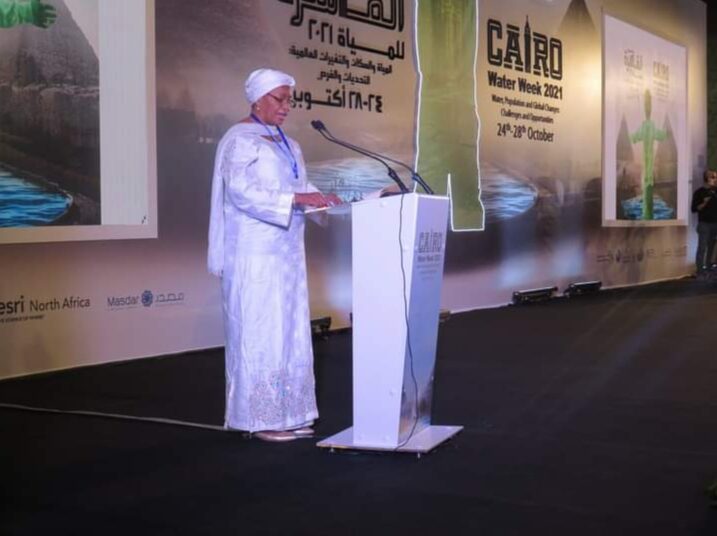Egypt and the Democratic Republic of Congo (DRC) have relations that were made unique by geography, history, and current co-operation.
Common interests between the two countries are based on the values of peace, stability, and their desire to achieve prosperity for their two peoples.
Egyptian-Congolese relations witnessed positive and remarkable developments at all economic, political, environmental and cultural levels in the past few years.
The same developments make it necessary for the leaderships of both countries to work hard to push co-operation even more forward.
The DRC chairs the African Union now. Given the African country’s importance and weight in the continent, the Egyptian Mail was keen to interview the Deputy Prime Minister and Environment Minister of the DRC, Eve Bazaiba Masudi, who was in Cairo recently to attend the Cairo Water Week.
The newspaper discussed a wide range of issues with the Congolese minister, including the challenges facing Africa and promising areas for co-operation with Cairo.
Masudi said water challenges coupled with the severe impacts of climate change have brought the issue of water security on top of the agenda of African governments.
“Water should be reason for co-operation, not conflict,” Minister Masudi said. “It should be a reason for peace that brings states and peoples together.”
Masudi said rivers cannot begin in one country and end in the same country.
They naturally, she said, flow through many countries.
“So, it is very important to know how to adopt a co-operative approach to water sharing and management,” the DRC official said.
Minister Masudi explained that water management ought to be based on the homogeneous management of water resources.
She noted that the DRC co-operates with neighbouring countries to create initiatives for co-operation in this domain.
She added that Congolese President, Felix Tshisekedi, has been actively involved in the row over Ethiopia’s Blue Nile dam.
“I am optimistic that there will be a co-operative solution [to the problem],” Minister Masudi said.
She called for addressing water scarcity through an integrated regional strategy that includes all parties.
Water, she said, is a great economic property and has a major role in development and the economy.
“Water is life and therefore must be shared,” Minister Masudi said.
The Congolese minister lauded Egypt’s water management strategy.
She said the DRC implements a water management project with Egypt.
Egypt, she added, sends experts to the DRC.
“We have a lot of water, but we do not know how technically we can give people clean water to drink,” she said.
During meetings with Egyptian Minister of Irrigation, Mohamed Abdel Ati, Minister Masudi asked him to extend a joint co-operation protocol with Egypt in the field of water for another five years until 2027.
Egypt is also constructing a flood forecasting center in Congolese capital, Kinshasa.
Minister Masudi said her country hopes future co-operation relations with Egypt would include Egyptian support to the DRC in the field of rainwater harvesting.
Egypt has already embarked on a project to drill 30 groundwater wells to provide clean drinking water to citizens in different parts of the DRC.
Preparations are also underway to implement the first phase of underground drinking water plants equipped with solar energy in the country.
Minister Masudi said water is an excellent empowering tool for women.
“From a demographic perspective, women rely heavily on water to finish house work,” the Congolese minister said. “It is very important to give African women access to water to support their families.”
Climate change has also been piling pressure on limited water resources, the minister said.
She added that she takes pride in Egypt’s plans to host the UN Conference on climate change COP27.
She said her country would host the preparatory meetings of the conference. “Egypt and Congo are partners and should work hand in hand as Britain and Italy are doing this year for COP 26,” Minister Masudi said.






Discussion about this post